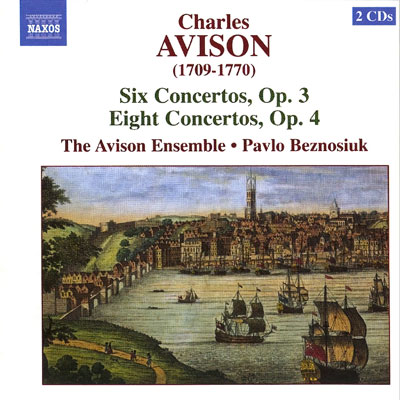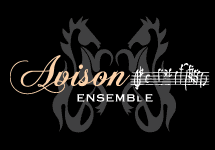 reviews
reviews
Charles Avison
Concertos Opus 3 and 4
The Avison Ensemble
Pavlo Beznosiuk (director & violin)

2 CDs on Naxos, Naxos 8.557905-06
• World premiere recording •
Gramophone Magazine
'These performances present them with affection, respect and a refreshing absence of turbo-Baroque eccentricities designed to grab the attention.'
Lindsay Kemp, November 2006
Affection, respect and, thankfully, no eccentricities for a Baroque Englishman.
Opinions differ as to whether the Newcastle composer Charles Avison really was (as the booklet _notes for this disc quote from New Grove) "the most important English concerto composer of the 18th century". What about the claims of John Stanley? Do we count Handel as English? Or for that matter Geminiani, who may well have been Avison's teacher? It does not really matter, of course. Avison was certainly an important and prolific concerto composer, and it has long been a shame that he is known mainly for his intriguing orchestral arrangements of Scarlatti sonatas, which, though irresistible in their way, are hardly representative of his art as a whole.
That art was a solidly conservative one in the Corellian concerto grosso tradition. The Avison Ensemble have apparently picked his most adventurous works for this offering, but apart from some unusual movement layouts in Op 4, it seems unlikely that the casual listener will feel that there is anything hugely experimental going on. That is not to say that they are without interest or charm, however, and it is evident enough what the qualities are that kept at least one of these concertos in the repertoire until the early years of the 19th century, namely warm tunefulness, smooth orchestral string textures and a forward energy that never threatens decorum. These performances, sweetly recorded in a Newcastle church, present them with affection, respect and a refreshing absence of turbo-Baroque eccentricities designed to grab the attention. Music as settled and self-assured as this can speak perfectly well for itself.
MusicWeb International
'They play Avison’s music with crisp precision and lively bounce, giving it an apposite stylishness.'
Robert Hugill, August 2006
Charles Avison’s principal contribution to the record catalogue has so far been his set of Concerti Grossi based on Scarlatti harpsichord sonatas. There’s more. In fact he wrote a considerable amount of music and it is good to see that the Avison Ensemble and Naxos are remedying the gap. They have already issued Avison’s Op. 6 set of concerti grossi (see reviews by Jonathan Woolf and Johan van Veen) and here we have a recording of his Opp. 3 and 4.
Born and brought up in Newcastle, Avison was initially taught by his father, before moving to London to seek fame, fortune and training at the age of fifteen. It was here that he probably met and studied with Geminiani, who had moved to London in 1714. Avison returned to Newcastle in 1735 to assume the post of organist at St. John the Baptist’s Church. From 1736 until his death he was organist at the city’s most important church, St. Nicholas. Avison instituted a series of subscription concerts which were presumably a fertile ground for his own compositions.
In life, Avison was a controversialist, proclaiming that the music of his master Geminiani was far superior to that of Handel. It was to Corelli’s and Geminiani’s models that Avison turned when writing his own concerti grossi. Generally Avison used the traditional four-movement slow-fast-slow-fast model. But for his Opp. 3 and 4 concertos Avison was a little more adventurous; he not only varies the number of movements but his harmonies depart from the customary practices.
The Op. 3 concertos were published in 1751 and the Op. 4 in 1755. In the extensive preface to the Op. 3 concertos, Avison includes information on performance practice, the number of instruments needed to balance the concertino and ripieno groups and the correct manner of playing the harpsichord.
Here the concertos are played by the Newcastle-based Avison Ensemble, directed by Pavlo Beznosiuk. Beznosiuk and the other unnamed soloists contribute some fine solo playing in the concertino sections and are well supported by the main ensemble. They play Avison’s music with crisp precision and lively bounce, giving it an apposite stylishness.
The ensemble sound a relatively small group; no numbers are given in the CD booklet and the group’s web site was still under construction at the time of writing. Whilst their string sound does not have the luxuriousness of some other groups, they play their chosen composer with wit and style. Their devotion extends beyond playing though: in 2001 and 2002 the group acquired two of the composer’s original work-books thus enabling them to extend the Avison repertoire.
The music on this disc does not have the inherent drama of Handel’s concerti grossi, but then Handel remained a dramatist no matter what the genre. Avison’s have a more civilised elegance about them and repay repeated listening. His music was enormously popular during his lifetime and it is surprising that such attractive pieces have been allowed to fall out of the repertoire. When Avison has been recorded, it has almost invariably been his concertos based on Scarlatti harpsichord sonatas, as if ensembles did not trust him to have enough imaginative invention in the pieces he created from scratch.
He wrote over fifty orchestral concertos and The Avison Ensemble have already recorded the Op. 6 concertos for Naxos. Given the stylish performances here, I do hope that we can look forward to more.


